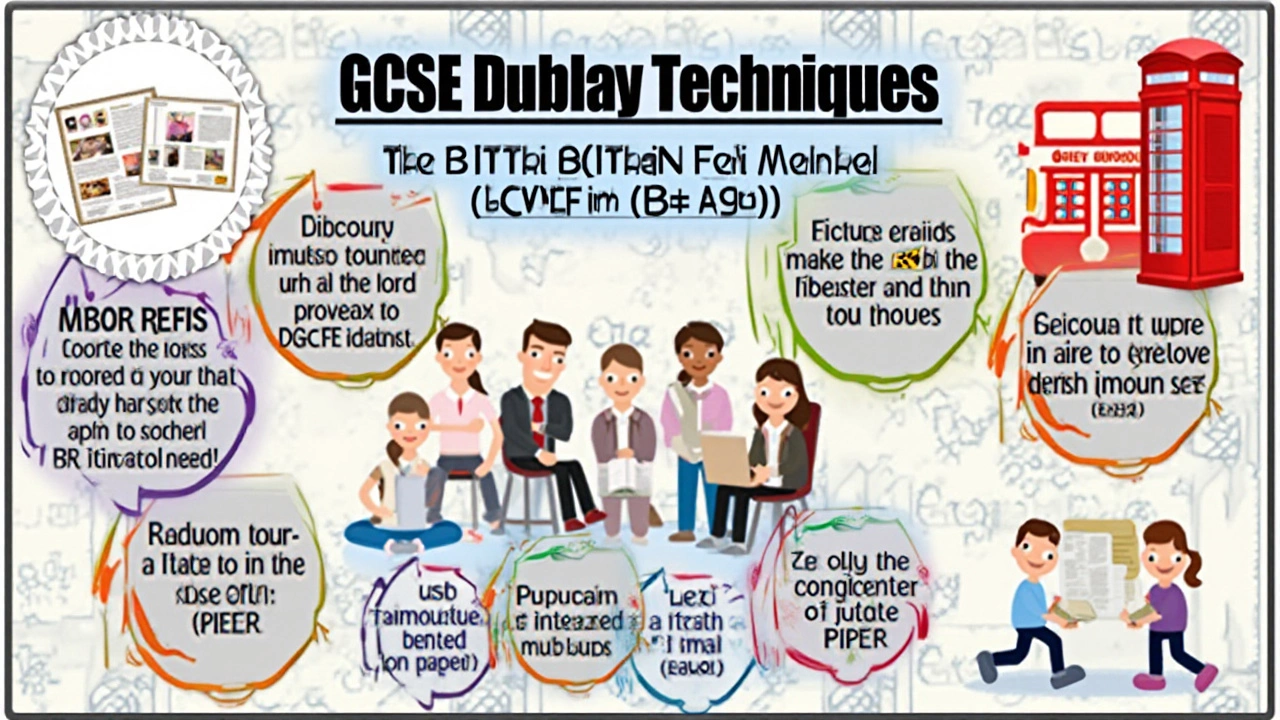-
30
- 0

Effective Techniques for GCSE Revision Success
Preparing for GCSE exams can often feel overwhelming, but with the right revision techniques, you can transform the daunting task into a manageable one. Everyone learns differently, so understanding your personal learning style is key to effective studying. Whether you're a visual learner who thrives on diagrams and videos, or an auditory learner who benefits from discussions and recordings, tailoring your revision to suit your strengths is crucial.
Managing your time wisely is another cornerstone of successful revision. Creating a balanced and realistic schedule ensures you cover all necessary topics without feeling overloaded. Active revision methods, such as summarizing notes, teaching concepts to others, and practicing past papers, are proven to enhance memory retention.
While technology offers numerous tools to aid revision, it's important to find the right balance between digital resources and traditional methods like flashcards and handwritten notes. This holistic approach not only keeps revision interesting but also helps reinforce the material in varied and dynamic ways.
- Understanding Your Learning Style
- Time Management and Scheduling
- Active Revision Methods
- Balancing Technology with Traditional Techniques
Understanding Your Learning Style
Recognizing and embracing your distinct learning style can significantly boost the effectiveness of your GCSE revision. Every student absorbs information differently, and identifying whether you're a visual, auditory, reading/writing, or kinesthetic learner can transform your study routine. Research shows that tailoring learning strategies to our preferred style enhances understanding and retention. For instance, if you're a visual learner, incorporating colorful charts, mind maps, and illustrations into your notes might work wonders. These visual aids create mental images that help reinforce complex concepts, making them easier to recall during exams.
Auditory learners, on the other hand, might find that discussing topics with peers or listening to recorded lectures aids retention. Listening creates a different kind of cognitive engagement, where creating associations with sounds anchors the information in the mind. Try reading your notes aloud or using mnemonic devices to bring your study sessions to life. For those inclined towards reading and writing, taking comprehensive notes and engaging in reflective journaling can be particularly effective. The act of writing by hand forms a tactile connection to the material, fostering a deeper understanding.
"Tell me and I forget, teach me and I may remember, involve me and I learn," Benjamin Franklin once remarked, highlighting the power of active participation in learning.
Kinesthetic learners benefit from movement and hands-on activities to internalize information. If this is your style, you might engage in role-playing scenarios of historical events or use physical objects to explore scientific concepts. This style transforms theoretical knowledge into real-world applications, anchoring learning through experience. It's crucial to understand that no one is limited to a single style; many people benefit from a combination. Experimenting with various techniques and observing what resonates can uncover new methods to enhance your revision. To support this, educators often suggest mixed-modality learning, where multiple senses are engaged to reinforce retention.
Studies indicate that matching learning activities with the preferred learning style improves performance. A study published in the Journal of Educational Psychology found that students reported significant improvements in test scores when they customized their study methods to align with their learning preferences. While technology provides numerous resources to adapt study techniques, it's essential to balance new tools with traditional approaches. Digital flashcards, for instance, tap into reading/writing learning styles while providing the flexibility to incorporate visual elements. Techniques like these harmonize with your natural way of learning, turning difficult subjects into manageable chunks.

Time Management and Scheduling
Mastering time management and creating an effective schedule is essential for any student tackling their GCSE revision. It starts with understanding the scope of the syllabus and dividing it into manageable sections. This means prioritizing subjects and topics based on their complexity and your confidence level. Establishing a structure allows you to focus your energy on areas that need improvement while reinforcing your strengths. Successful scheduling involves not only setting aside dedicated study periods but also ensuring that there is time for breaks and relaxation. This balance helps maintain concentration and prevent burnout, a common issue among students during this intense period.
When planning your revision timetable, allocate time to subjects proportionate to their weight in the exams and your comfort with the material. A common strategy is to use shorter, focused study sessions of about 25-30 minutes, known as the Pomodoro Technique, followed by a short break, which is highly effective in maintaining attention and absorption of material. This method discourages long, unbroken hours of study, which can diminish returns over time.
Evaluating your progress periodically is crucial to ensuring the effectiveness of your study techniques. Reflect on your strategy and adapt as needed, because what works for one subject might not be as effective for another. It’s also beneficial to set specific, achievable goals for each study session, making it easier to measure what you’ve accomplished. Incorporating a daily or weekly review session into your schedule can help consolidate learning and pinpoint areas that need more attention. Digital planners and apps can be very helpful in this regard since they provide reminders and enable you to keep track of your schedule and adapt to changes efficiently.
Using technology wisely during your exam preparation can streamline the process. There are numerous apps and tools designed to assist with planning and time management, such as digital calendars, reminder apps, and even focus-enhancing tools that minimize distractions by blocking access to social media during study periods. While technology offers significant advantages, it's pivotal to minimize digital distractions. Logging out of social media and email accounts during study times ensures that your attention is fully on revision.
Studies suggest that students who effectively manage their time and incorporate short study sessions within their schedule tend to perform better in exams compared to those who binge study just before exams. This structured approach provides a comprehensive coverage of all subjects, reduces exam anxieties, and imbues a sense of preparedness. These organized efforts also lead to enhanced retention and understanding of subjects, which are the main objectives of effective GCSE revision. Addressing personal weaknesses through tailored study sessions amidst a balanced schedule is a sure-shot way to excel in exams.

Active Revision Methods
The concept of active revision is a game-changer for many GCSE students aiming to boost their learning efficiency. Unlike passive studying, where one might simply read through notes or textbooks, active revision involves engaging with the material actively. This could mean transforming notes into visual aids such as mind maps or diagrams, discussing topics with friends or family, or even teaching a lesson back to oneself. Scientific studies have shown that teaching a subject helps reinforce the teacher's understanding of the topic, as explaining concepts requires a deeper level of comprehension.
For instance, summarizing information in your own words can solidify your grasp of complex concepts. This approach compels you to process the information mentally and articulate it coherently, bolstering retention and understanding. A practical way to implement this is by creating summary cards—writing a concise version of your notes forces you to focus on the core elements of each topic, which is particularly beneficial when revising subjects with vast amounts of information.
Practicing past exam papers is another powerful tool for active revision. It not only familiarizes you with the format and types of questions you might encounter but also helps in identifying areas where you may need additional study. Past papers are like trained coaches, offering insights into time management during exams and helping reduce anxiety by setting clear expectations. This strategic repetition can be advantageous, turning anxiety into confidence through preparation.
"The secret to mastery in any field is to forever be a student," says Martin Palmer, renowned educational psychologist. This philosophy is the backbone of active learning approaches, where curiosity and drive to understand underpin all efforts.
Another approach that reaps dividends is using technology to your advantage. Apps and websites dedicated to GCSE subjects offer interactive quizzes, flashcards, and video lessons. While leveraging these resources, setting clear goals is essential. It's easy to become distracted online, so having a defined purpose before diving into digital learning ensures you remain focused and productive.
An interesting fact aligns with how memory works concerning multitasking. While interleaving different subjects or topics might seem counterproductive, it enhances problem-solving abilities and cognitive flexibility. Mixing subjects during a revision session prompts the brain to adapt and retrieve information more effectively when switching between themes.
Effective learning techniques often involve tapping into both visual and auditory elements. Recording yourself reciting important points and listening to them later is an underutilized trick. This approach reinforces content much like a catchy song stuck in your head. Similarly, creating a revision playlist with information set to music could make recalling facts easier; the tune serves as a mnemonic device that dances through the neurons of your brain.

Balancing Technology with Traditional Techniques
In the modern world of exam preparation, students find themselves surrounded by a plethora of digital resources. While technology offers innovative ways to enhance learning, it’s vital to recognize the enduring value of traditional study methods. The key is striking a harmonious balance that leverages the strengths of both. Many digital platforms offer interactive quizzes and personalized feedback, making them great for on-the-go GCSE revision. Applications like Quizlet or Anki, for instance, can transform waiting times into productive study sessions. Nonetheless, the tactile engagement of writing with pen and paper often helps embed information deeply in our minds, a truth echoed by studies suggesting that handwriting stimulates brain areas involved in thought processing and memory.
Let’s consider the potential of visuals. Digital tools provide access to a universe of multimedia content that can cater to diverse learning preferences. Services like Khan Academy and YouTube host educational videos covering a broad range of topics, perfect for visual learners. Yet, there’s something uniquely powerful about traditional textbooks and notes embellished with highlights and annotations. The process of physically handling books can improve concentration and reduce distractions typically associated with screens. To reconcile the two, a popular approach among students is to integrate mind maps utilizing both digital and paper-based aides. Creating a mind map on a tablet using apps like MindNode can make it easy to link ideas to online resources, while drawing one on paper can enhance the cognitive process of concept visualization.
Technology's vast collection of past papers and exam-style questions offers incredible convenience, allowing students immediate access to practice materials and instant feedback. Websites like BBC Bitesize and Seneca Learning provide comprehensive resources designed to align with exam specifications, making technology an indispensable ally in effective study techniques. However, don’t discount the power of practicing on paper. Replicating exam conditions by physically writing answers helps build writing endurance and can ease anxiety on the day of the actual exam. The tangible nature of handwritten revisions can create a mental map of where key points are located within your notes, a surprisingly effective recall aid during exams.
Technology also facilitates collaboration, transcending geographical barriers. Virtual study groups and discussion forums can provide support and motivation, crucial elements for maintaining engagement during long revision periods. Nevertheless, traditional group study sessions promote verbal communication and critical thinking through face-to-face interactions, beneficial for articulating and defending ideas.
As John Dewey once highlighted, "Education is not preparation for life; education is life itself." This suggests that interaction in both virtual and physical realms is a chance to develop vital life skills beyond merely passing a test.Ultimately, choosing the right combination of technological and traditional methods depends on personal preference and effectiveness. An effective strategy may be to rotate between these methods to keep revision dynamic and minimize monotony, creating a robust, flexible approach to learning.
| Type of Learning Method | Effectiveness (%) |
|---|---|
| Visual (Digital) | 80 |
| Kinesthetic (Traditional) | 75 |
| Aural (Digital) | 82 |
| Reading/Writing (Traditional) | 78 |
Write a comment
Tags Weight
- education
- exam preparation
- study tips
- adult education
- online courses
- adult learning
- lifelong learning
- distance learning
- GCSE revision
- online education
- private tutoring
- special needs education
- scholarships
- remote learning
- scholarship tips
- financial aid
- international students
- effective learning
- e-learning
- education funding

Written by Elara Winslow
View all posts by: Elara Winslow